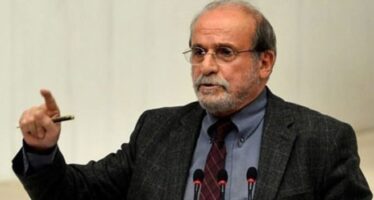Bitlis bones might shed light on unsolved murders
![]()
ISMA?L AVCI
B?TL?S

Bones belonging to 12 individuals who went missing in the 1990s were found during an excavation that started on Wednesday in Bitlis’ Mutki district.
Investigators looking for the bodies of some people who went missing in the 1990s — allegedly as a result of the activities of an illegal network inside the gendarmerie called J?TEM — have found the remains of 12 human bodies in the Mutki district of Bitlis province.
J?TEM is thought to be responsible for most of Turkey’s unsolved murders in the predominantly Kurdish East and Southeast.
The particular area that was excavated as part of the investigation was chosen based on information in an application the Bitlis Prosecutor’s Office about six months ago, tipping off investigators as to the possible location of bodies. So far, bones as well as pieces of clothing that belonged to 12 different individuals have been found in the excavation that started on Wednesday at a foothill near the Mutki District Gendarmerie Command. The finds have been sent to the Council of Forensic Medicine (ATK) for forensic examination.
Investigators say the bodies might belong to civilians allegedly killed by J?TEM officers as well as members of the terrorist Kurdistan Workers’ Party (PKK). Gendarmerie and police teams are collaborating on the operation, for which tightened security measures have been taken in the area.
Troops have been deployed on every single hilltop in the district, which is surrounded by mountains. Officials did not allow journalists to photograph the scene during Wednesday’s excavation. Journalists who flocked to the region after the start of the excavation were kept under surveillance by the gendarmerie and plain clothes police officers.
The excavation is the result of an application to the prosecutor’s office filed two years ??Just checking, first we said it was the result of one filed 6 months ago, now 2 years, and then later 6 months again. So it’s really the result 2 applications, not one, right. ago by the families of those who disappeared. The families alleged that some villagers accused of assisting the PKK were executed in 1993 and buried in the area where bones were found on Wednesday. Another claim of the families was that PKK terrorists captured dead or alive in clashes in Mutki’s Çaygeçit, Ball?, Kavakba?? and Ersan River areas were often executed if not already dead and buried in a landfill in front of the gendarmerie command building. Mehmet Nuri K?z?lkaya, the brother of PKK militant Alican K?z?lkaya who was killed in clashes; Gülevi Eren, the brother of PKK militant Mehmet Eren; and Mahmut Çalgan, the father of PKK militant Cevdet Çalgan, applied to the prosecutor’s office about six months ago demanding the area be excavation. The families made it clear that PKK militants killed in clashes and possible new recruits to the PKK, mainly young people who’d left their homes to join the organization, were buried in the area near the Mutki Gendarmerie Command. The prosecutors were able to start the excavations this week after receiving the necessary permission.
The area falls under the jurisdiction of the gendarmerie, but police officers are also working on the excavation. Many residents say the Mutki landfill, inside the gendarmerie’s jurisdiction, has been used as a burial site for extra-judicial killings. A local store owner, E.K., who has had his business in the area for 30 years, says bodies were buried in this area three times, in the years 1993, 1996 and later in 1999. E.K. says the pits where the bodies are buried were dug by machines owned and operated by the municipality. Former municipal workers who testified to the Bitlis prosecutor as part of the investigation claim that O.G., also a former municipal worker who operated an excavating machine, personally participated in these operations by digging holes for the bodies.
Meanwhile, at a press conference the Bitlis Bar Association released a statement on the excavations on Wednesday. Enis Gül, the head of the association, said, “We will follow up on this and do all that we can if there have been violations of human rights in any of this.” He said results of the forensic tests will shed light on many of the questions regarding the investigation.
Related Articles
ICG: Kurdish question would be solved through dialogue not war
![]()
International Crisis Group says a solution to the Kurdish issue can only lie in advancing the constitutional, language and legal
Netanyahu rules out return to 1967 borders
![]()
Prime minister to set out “vision for peace” to US Congress, but says Israel “cannot return to indefensible 1967 lines”.Binyamin
HDP Kürkçü: Future of Turkish democracy at stake in 24 June elections
![]()
On Sunday the peoples of Turkey will go to the polls in one of the elections most unfair and uneven ever held in the 150 years of Turkey’s elections history



